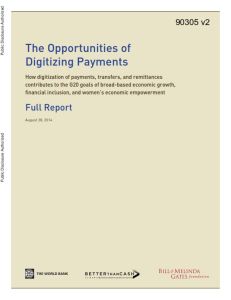Join getAbstract to access the summary!

Join getAbstract to access the summary!
Leora Klapper and Dorothe Singer
The Opportunities of Digitizing Payments
How Digitization of Payments, Transfers, and Remittances Contributes to the G20 Goals of Broad-Based Economic Growth, Financial Inclusion, and Women’s Economic Empowerment
World Bank, 2014
What's inside?
Setting up digital payment programs in developing markets presents both opportunities and challenges.
Recommendation
In the digital age, a cashless society seems on the horizon for many developed markets. But in developing countries, cash remains king. People in these nations must rely on inefficient postal systems, crooked local officials and expensive methods of transfer to get their wages or other disbursements. This study from World Bank researchers Leora Klapper and Dorothe Singer provides an enlightening look at how moving from cash to electronic payments can help disadvantaged populations in low-income countries. getAbstract recommends this timely report to anyone interested in reaching new consumers in emerging markets.
Summary
About the Authors
Leora Klapper and Dorothe Singer work in the development research group at the World Bank.


















Comment on this summary